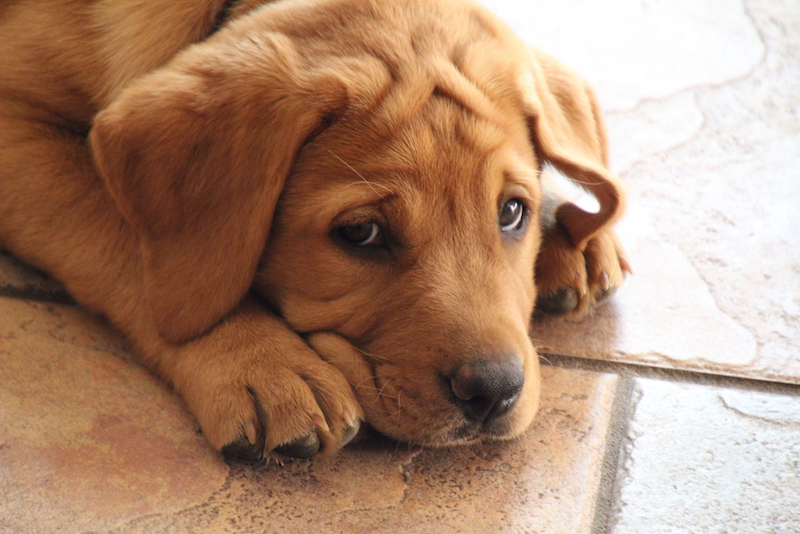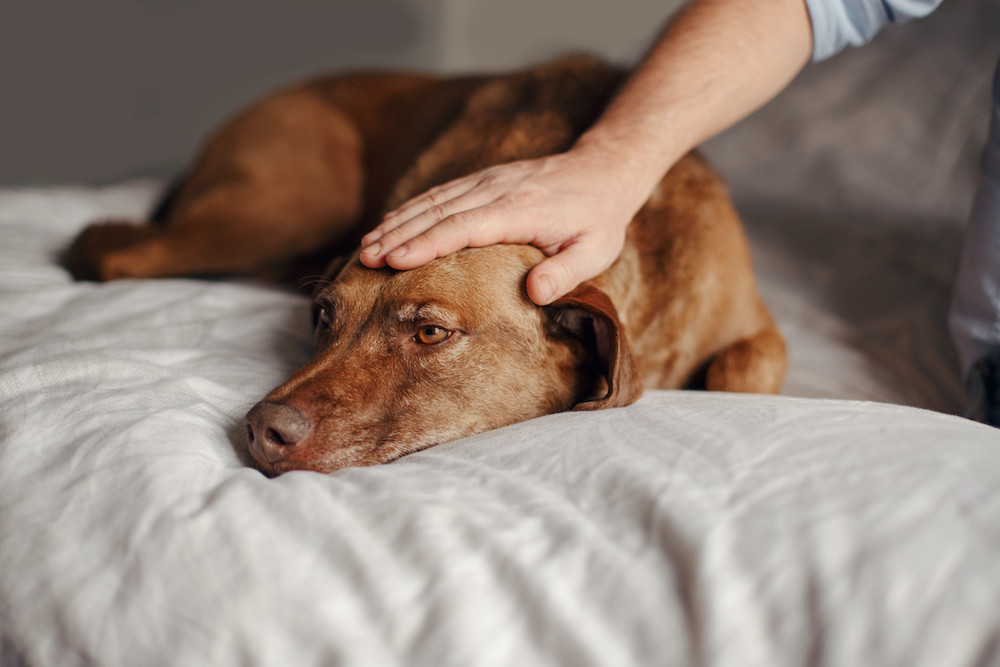Humans love their dogs, and grieve when they die. Because we can’t read our dogs’ minds, it’s natural to wonder whether they, too, feel grief when losing human and animal friends. The answer to that question may depend on how you define “grief”—but, based on their behavior, it’s safe to say that dogs feel sad when those they’re close to are gone.
Dogs are social, emotional animals who love their family and friends
When we asked experts what humans could do to make their dogs’ lives happier, one common piece of advice was to spend quality time with them. Dogs’ sociability is written into their DNA, and the presence of a beloved human can help them weather challenging situations like vet visits or get more enjoyment out of a walk or a trip to the park. Because those bonds are so vital to dogs, and because we know that they can experience states like joy, anxiety, and depression, it’s natural to think that the absence of someone they love would have a major impact on them.
Dogs who go a long time without their favorite people and animals—whether due to death or for another reason—show changes in behavior. When a person or another animal in a dog’s home dies or goes away for a long time, the remaining dog may be less playful, eat more or less, seek more attention, spend more time sleeping, or want more time alone—their behavioral changes can vary as much as those of a person who’s going through a difficult period. Dr. Marc Bekoff, Professor Emeritus of Ecology and Evolutionary Biology at the University of Colorado, Boulder, says that the key to weighing the meaning of your dog’s behavior is to know their personality and judge whether something has changed.
Many dog owners will tell you that they don’t need proof of dogs’ sadness when they lose a friend, but researchers have tackled the question: a 2022 survey of Italians with dogs found that most pups who lost another dog in their household exhibited behaviors that humans associate with grief.
Taking all of this into account, can we say that dogs feel grief? After years of working and living with dogs, Dr. Bekoff doesn’t hesitate in his answer to the question: “Without a doubt, yeah.”

Dogs may not know what death is, but…
Dr. Clive Wynne, Director of the Canine Science Collaboratory at Arizona State University and author of the book Dog Is Love, says that dogs feel sad when their people go away—but he wouldn’t call it grief. “Dogs miss people who are absent,” he says, “but I don’t believe they understand death as such—so I don’t imagine that they actually grieve as we understand [it.] I don’t think they understand that a deceased person is never coming back… I don’t think a dog knows the difference between ‘I’m dead’ and ‘I’ve gone to Europe for six weeks.’”
Dr. Sarah Byosiere, Director of the Thinking Dog Center at Hunter College, says that “‘Grieve’ is in some ways a loaded term” because of humans’ feelings about death—and that it’s difficult to evaluate the presence of such an emotion in an animal that doesn’t use spoken or written language to communicate.
“When we work with animals,” she says, “we have this black box—which is their brain, how they think about things… So we measure the less subjective outcomes, which are the ways in which they’re interacting with the world around them” But, she says, researchers can’t be certain why those behavioral changes take place. It could be grief, a disruption to a routine, changes in the smells given off by the humans around them, or other factors. And when humans are the ones reporting their own dogs’ behavior, there’s the added possibility that they could be projecting their own feelings of grief onto their surviving dogs. “Those things are really difficult to control,” says Dr. Byosiere.
But, overall, she says: “If we are measuring changes in behavior after the loss of either a human or a fellow animal, I think that there is some evidence to suggest that we see these mourning-like behaviors.”
It’s true that we can’t have long conversations with dogs, interesting button-based experiments notwithstanding. And there’s no direct evidence that they understand what death is. On the other hand, how well do even humans understand death? Not all people have the same beliefs about what happens when someone passes away—some believe in an afterlife where they’ll be reunited with loved ones and others do not, for example—yet almost all of them mourn when those they care about die.
Dr. Bekoff says that dogs seem to be able to tell that something is “off” when their fellow dogs are dying, through cues that have to do with behavior, smell, and sounds. Their behavior in those situations, like in this story Bekoff shared in a blog post, suggests that they know something bad is happening. Still, he adds: “Even if it’s a death odor, I don’t know that [dogs] have that concept of death.”

People love stories about the bond between humans and dogs
There are numerous stories of dogs demonstrating their loyalty to deceased humans by sticking to old routines or seeming to keep vigil by their graves. Among the most famous is the case of Hachikō, an Akita who used to wait every night at a train station to greet his human, a college professor named Hidesaburo Ueno, after his evening commute. After Ueno unexpectedly died at work one day, Hachikō kept returning to the station every night for a decade. The story inspired tributes like statues and movies, and many took it as an indication that the dog was mourning his person or hoped to see him again.
We can’t know what Hachikō was thinking—whether he expected to be reunited with Ueno, whether the routine soothed him, or whether someone offered him favorite snacks when he kept going to the station. “At some point,” Dr. Bekoff says, “the expectation that his human is coming back may not even be in his mind—but it’s a comfortable place to be.” He compares it to the behavior of a woman he knew who lost her husband, but continued to take their morning walk after his death. “I know he’s not coming back,” he remembers her saying, “but it’s very comforting to walk where we walked.”
Dr. Wynne says that people have “overinterpreted” some stories of loyal dogs mourning their humans, “and some of them were intentionally embellished.” He gives the example of Greyfriars Bobby, a dog in Edinburgh, Scotland who’s said to have spent years guarding the grave of his deceased human. In Dr. Wynne’s view, “Street dogs actually really like graveyards, because it’s an opportunity to get some peace and quiet… dogs have to sleep 14 hours a day.” He says that part of the reason Greyfriars Bobby became so well-known is that “there was actually a nearby cafe owner who blew up this story because it encouraged patronage at his cafe—including people buying meals for the dog.”
However, Dr. Wynne does not want to play down the connection between humans and dogs: “I don’t view any of this as pricking the balloon of the dog-human relationship,” he says. “On the contrary, I really think that all of these are quite wonderful stories about how people care about dogs—and, in many ways, how dogs care about people—and how that expresses itself in different cultures at different times.”

Dogs need support when they lose someone
Regardless of what words you’d use to describe a dog’s feelings after losing someone close to them, they need support to get through that difficult time.
“Give them a little more love,” says Dr. Bekoff. “They may come ask for it—don’t allow them to think that they’re pestering you. They have deep emotions.”
Dr. Wynne advises humans to “sustain as much of the dog’s routine as you can.” When a human dies, a dog may go through changes as extreme as rehoming. The more their life can stay the same during an inevitably challenging moment—whether that stability comes from being with other known humans and animals, living in the same house, or engaging in familiar activities like walks to some favorite places—the better.
Dr. Byosiere suggests spending more quality time with the surviving dog through activities like “fun sniffy walks,” and giving them some extra affection if that’s something they enjoy.
Be there for your dog and follow their lead about what’s making them feel better. If they’re taking some time to mourn, that’s fine—it makes sense that they would feel sad. And a human looking after a dog who’s experienced loss is likely to be going through grief as well if they also know the person or animal who passed away. “Be compassionate about yourself as a human first… Don’t force them, and don’t force yourself,” Dr. Byosiere says of situations where a dog, or you, may not be up for too much activity. Whenever you do get out and do something together, she says, “I’m not saying it’s going to be sunshine and rainbows as soon as you go on a walk—but maybe your dog does something funny, and it makes you laugh; one good thing in that day, and that’s part of the process.

Dogs can move on after a loss
Dogs feel sad when someone they love dies. But, with support, they should be able to live happy lives in the long run after a loss.
“Our dogs can spend a couple or ten years living in a human family,” says Dr. Wynne, “and then if that family disappears from their life—whether they are dead or the dog is just rehomed and has no way of knowing whether these people are dead—the dog will successfully rehome in a few months.”
“It’s not to say that your relationship is not important, that the attachment isn’t strong,” says Dr. Byosiere, “but maybe that the attachments they develop with others sort of parallel our attachments with people when they move on, or we lose friendships when people pass away or we move. You can mourn those, and it lasts a little while, and you can think about them, but you can still detach—and that might be what’s evolutionarily advantageous, and what’s happening in both species.”









